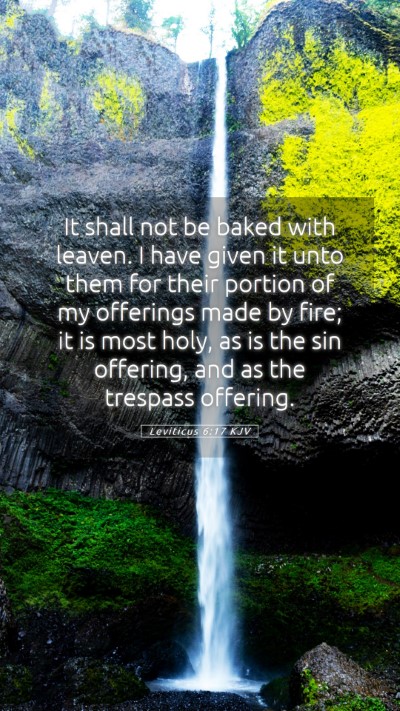Bible Verse Meaning: Leviticus 6:17
Bible Verse: Leviticus 6:17 - "It shall not be baked with leaven. I have given it to them for their portion of My offerings made by fire; it is most holy, like the sin offering and the trespass offering." (NKJV)
Understanding Leviticus 6:17
Leviticus 6:17 is a crucial verse in the context of the Levitical laws regarding offerings and sacrifices. This scripture emphasizes the significance of maintaining purity and holiness in the offerings presented to God.
Insights from Commentaries
-
Matthew Henry:
Henry stresses the importance of distinguishing between holy offerings and those that are common. He notes that the prohibition of leaven symbolizes a call to purity. Leaven often represents sin or corruption in Scripture, and its exclusion from the offerings serves as a reminder that God desires a pure heart and unblemished offerings.
-
Albert Barnes:
Barnes highlights that the offerings mentioned are "most holy," which indicates their special status and the respect they demand. He reinforces that these offerings were integral to the worship and atonement process, legitimizing the seriousness of bringing the correct and pure offerings before God. He also elaborates on the implications of the terms 'sin offering' and 'trespass offering' as they relate to the atonement and the community's relationship with God.
-
Adam Clarke:
Clarke nuances the significance of this verse by linking the baking process with the rituals inherent in the sacrificial system of Israel. He explains that the lack of leaven in these offerings not only speaks to physical purity, but also symbolizes a deeper spiritual truth, urging the faithful to approach God with sincerity, free from corruption and deceit.
Thematic Interpretations
Overall, Leviticus 6:17 can be seen as a teaching moment focused on:
- Purity: The absence of leaven underlines the need for purity in one's worship and offerings to God.
- Holiness: Identifying offerings as "most holy" elevates their standing and gives weight to the sacredness of worship.
- Community Responsibility: The verse reminds the community of their collective role in maintaining the standards set by God in their devotional practices.
Application and Relevance for Today
In applying Leviticus 6:17 today, one might reflect on the metaphor of leaven in their lives. Just as leaven corrupts dough, so too can sin corrupt our hearts and our worship. Engaging in thoughtful Bible study groups can help in interpreting and applying these lessons effectively. Consider how to bring sincerity and integrity into your spiritual practices, echoing the intent behind ancient offerings.
Cross References
This verse correlates with several other scriptures that emphasize holiness and the nature of offerings:
- Exodus 12:15: Discusses the removal of leaven during Passover.
- 1 Corinthians 5:6-8: Paul draws on leaven as a metaphor for sin in the church.
- Hebrews 10:10: Highlights the offering of Jesus as the ultimate sacrifice, calling for holiness in the ritual of worship.
Conclusion
Leviticus 6:17 serves as an essential reminder of the standards God desires from His people in terms of worship. As we delve into these bible verse meanings and bible verse interpretations, it's crucial to grasp the characterization of offerings and the expectations of purity in our spiritual lives. Engaging in thorough Bible study insights can lead to profound reflections on how we approach God today.
Further Study Recommendations
For those interested in developing a deeper understanding of scripture such as Leviticus 6:17, consider exploring these Bible study resources:
- Online Bible study tools: Utilize search functions and commentaries to explore various translations.
- Bible study lessons: Join or form study groups to discuss interpretations and applications.
- Historical context of Bible verses: Research the cultural and historical backdrop of the Old Testament laws.


